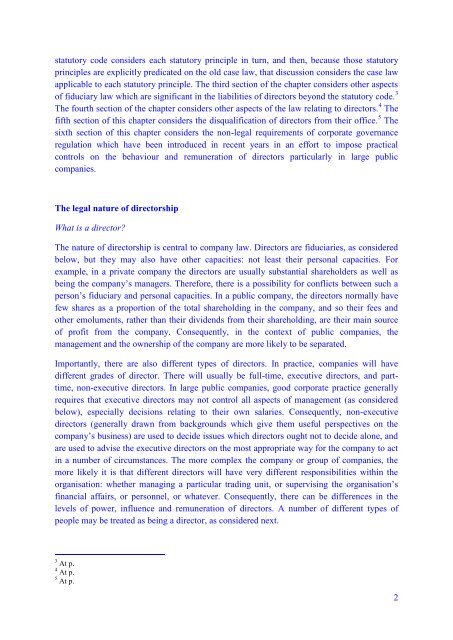Chapter 7 Directors' Duties - alastairhudson.com
Chapter 7 Directors' Duties - alastairhudson.com
Chapter 7 Directors' Duties - alastairhudson.com
Create successful ePaper yourself
Turn your PDF publications into a flip-book with our unique Google optimized e-Paper software.
statutory code considers each statutory principle in turn, and then, because those statutory<br />
principles are explicitly predicated on the old case law, that discussion considers the case law<br />
applicable to each statutory principle. The third section of the chapter considers other aspects<br />
of fiduciary law which are significant in the liabilities of directors beyond the statutory code. 3<br />
The fourth section of the chapter considers other aspects of the law relating to directors. 4 The<br />
fifth section of this chapter considers the disqualification of directors from their office. 5 The<br />
sixth section of this chapter considers the non-legal requirements of corporate governance<br />
regulation which have been introduced in recent years in an effort to impose practical<br />
controls on the behaviour and remuneration of directors particularly in large public<br />
<strong>com</strong>panies.<br />
The legal nature of directorship<br />
What is a director?<br />
The nature of directorship is central to <strong>com</strong>pany law. Directors are fiduciaries, as considered<br />
below, but they may also have other capacities: not least their personal capacities. For<br />
example, in a private <strong>com</strong>pany the directors are usually substantial shareholders as well as<br />
being the <strong>com</strong>pany‟s managers. Therefore, there is a possibility for conflicts between such a<br />
person‟s fiduciary and personal capacities. In a public <strong>com</strong>pany, the directors normally have<br />
few shares as a proportion of the total shareholding in the <strong>com</strong>pany, and so their fees and<br />
other emoluments, rather than their dividends from their shareholding, are their main source<br />
of profit from the <strong>com</strong>pany. Consequently, in the context of public <strong>com</strong>panies, the<br />
management and the ownership of the <strong>com</strong>pany are more likely to be separated.<br />
Importantly, there are also different types of directors. In practice, <strong>com</strong>panies will have<br />
different grades of director. There will usually be full-time, executive directors, and parttime,<br />
non-executive directors. In large public <strong>com</strong>panies, good corporate practice generally<br />
requires that executive directors may not control all aspects of management (as considered<br />
below), especially decisions relating to their own salaries. Consequently, non-executive<br />
directors (generally drawn from backgrounds which give them useful perspectives on the<br />
<strong>com</strong>pany‟s business) are used to decide issues which directors ought not to decide alone, and<br />
are used to advise the executive directors on the most appropriate way for the <strong>com</strong>pany to act<br />
in a number of circumstances. The more <strong>com</strong>plex the <strong>com</strong>pany or group of <strong>com</strong>panies, the<br />
more likely it is that different directors will have very different responsibilities within the<br />
organisation: whether managing a particular trading unit, or supervising the organisation‟s<br />
financial affairs, or personnel, or whatever. Consequently, there can be differences in the<br />
levels of power, influence and remuneration of directors. A number of different types of<br />
people may be treated as being a director, as considered next.<br />
3 At p.<br />
4 At p.<br />
5 At p.<br />
2













